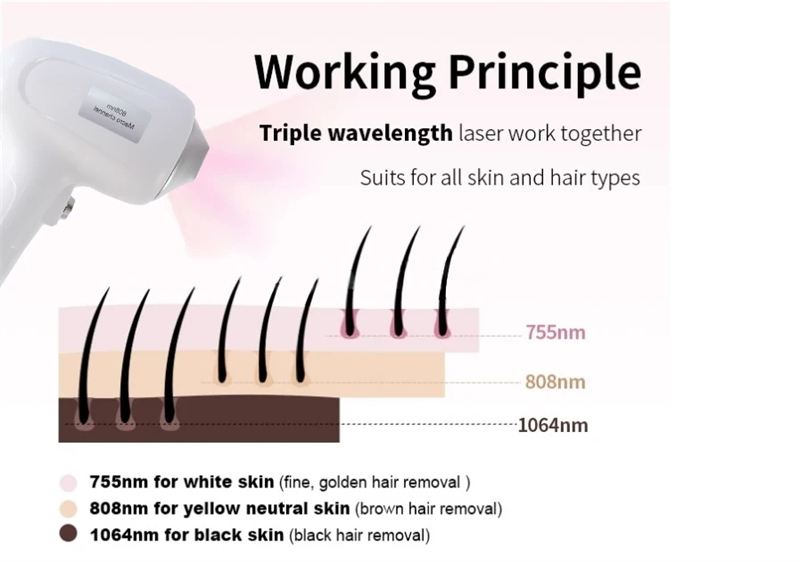
Does laser hair removal cause fertility problems?
2025-10-03 15:30
With the rapid advancement of cosmetic technology, laser hair removal, as an effective, safe, and long-lasting hair removal method, has become widely used in medical aesthetics clinics and beauty centers. At the same time, questions have gradually surfaced about whether laser hair removal affects other body systems.
One of the most concerning questions is, "Does laser hair removal affect fertility?" This article will provide a comprehensive, in-depth, and professional analysis of the question of whether laser hair removal machines can cause fertility problems, based on medical, physiological, and device technology. The conclusion is clear: No.
This article will address the following five aspects:
1. The working mechanism of the laser hair removal machine
2. Spatial isolation between the laser's action level and the reproductive system
3. The relationship between laser hair removal machine use frequency and reproductive function
4. Safety assessment standards from authoritative research institutions
5. Scientific refutation of common rumors

Laser hair removal machines: They only act superficially on the hair follicles
To answer the question of whether laser hair removal affects fertility, we must first understand how the laser hair removal machine works.
1. The Basic Principle of Laser Hair Removal
Laser hair removal utilizes the principle of "selective photothermolysis." A laser hair removal machine releases high-energy laser light of a specific wavelength, targeting melanin in the skin—the pigment in hair follicles. The laser absorbs the light energy and converts it into heat, thereby destroying the follicle structure and achieving the desired hair removal effect.
2. Wavelength Types of Laser Hair Removal Machines
Commonly used laser hair removal machines have the following wavelengths:
• 755nm (Alexandrite laser)
• 808nm (semiconductor laser, also known as 808 laser hair removal machine)
• 1064nm (Nd:YAG laser)
Different wavelengths correspond to different penetration depths and sensitivity to skin pigmentation. For example, the most widely used 808 laser hair removal machine has a penetration depth of 2-5mm, affecting only the hair follicles in the superficial dermis, well beyond the reach of reproductive organs or internal organs.
3. Laser hair removal machines offer exceptional targeting
Laser hair removal machines utilize a specific wavelength and pulse width to precisely target melanin-rich hair follicles. Since structures like the reproductive organs, uterus, ovaries, and testicles lack such high concentrations of melanin, the laser energy is not absorbed by these structures and does not cause any damage.

Laser action layer is spatially isolated from the reproductive system
1. Laser action is limited to the skin's surface layer
As mentioned above, the laser hair removal machine's action range is limited to the epidermis to the mid-superficial dermis, with a penetration depth of less than 1 cm. The human reproductive system, however, is primarily located within the abdominal and pelvic cavities, where organs are protected by layers of muscle, fat, fascia, and tissue.
For example:
• The female ovaries and uterus are located deep within the abdominal cavity, at least 6 to 10 cm below the skin.
• Although the male testicles are located in the scrotum, laser radiation only targets the hair follicles in the skin and does not penetrate deep into the testicular tissue itself.
Anatomically, a laser hair removal machine cannot reach these structures and lacks the ability to penetrate such deep tissue.
2. Laser radiation cannot diffuse through tissue
Laser light propagates in a straight line through human tissue, and is rapidly absorbed by the surface melanin as it travels through human tissue, preventing widespread diffusion. Therefore, even when laser hair removal is performed on intimate areas, proximity to the genitals will not affect them.
The frequency of laser hair removal is not related to reproductive function
Laser hair removal treatments are typically performed every four to six weeks, aligning with the hair growth cycle, with a typical treatment frequency of six to eight sessions.
1. Low frequency, low cumulative dose
Unlike high-energy penetrating treatments like radiotherapy, laser hair removal machines utilize low-energy, shallow, localized irradiation devices. Even within a full course of treatment, the total energy generated by multiple treatments does not accumulate or affect deeper tissues.
2. No endocrine disruption
Laser hair removal machines do not involve drugs, hormone manipulation, or entry into the body. Therefore, they do not affect the functioning of endocrine systems such as sex hormones, pituitary function, or the thyroid gland. Their hair removal mechanism is entirely based on a photothermal reaction and is unrelated to reproductive hormone regulation.

Safety Assessment and Certification of Laser Hair Removal Machines by Authoritative Organizations
Several medical device regulatory agencies worldwide have conducted extensive evaluations and certifications of laser hair removal machines.
1. US FDA (Food and Drug Administration)
The FDA has approved several laser hair removal devices for marketing, including the 808 laser hair removal machine. Its review criteria for "effects on the reproductive system" concluded that the device is non-teratogenic, non-reproductive toxic, and has no long-term organ effects.
2. EU CE Marking
All laser hair removal machines marketed in the EU must pass CE safety certification. This certification requires safety assessments of all contact areas, including testing for genital hair removal. The results of these assessments are also clear: no evidence of adverse effects on the reproductive system.
3. China NMPA and Other National Agencies
The China National Medical Products Administration (NMPA) also has a clear classification and registration approval process for laser hair removal devices. Products must meet medical device classification standards, and testing covers multiple dimensions, including electromagnetic compatibility, thermal effects, and surface tissue reactions.
Scientific Refutation of Common Myths
Despite the established facts, some misconceptions persist online. The following are scientific responses to these common myths.
Myth 1: Laser hair removal in private areas will damage the ovaries or testicles
Rebuttal: The energy from a laser hair removal machine does not penetrate more than 5 mm below the skin and is not absorbed by non-melanin-producing tissue. Therefore, the ovaries and testicles are outside the laser's range and pose no risk of irradiation.
Myth 2: Laser hair removal will damage eggs or sperm
Rebuttal: Sperm and eggs reside deep within the testicular and ovarian tissues, completely out of reach of the laser hair removal machine. Furthermore, lasers are not ionizing radiation and have no "mutational" potential, thus not affecting reproductive cell quality.
Myth 3: Laser hair removal will cause menstrual irregularities or decreased sexual function
Rebuttal: Menstrual regulation is related to the hypothalamic-pituitary-ovarian axis; laser hair removal machines do not affect the endocrine system. Sexual function, on the other hand, is related to multiple psychological, neurological, and hormonal factors and is not caused by laser treatment. Currently, no scientific research has proven a link between laser hair removal and changes in menstruation or sexual function.

Laser hair removal machines do not cause fertility problems
A comprehensive evaluation of the device's mechanism, depth of application, physiological isolation, safety data, and authoritative certifications confirms that:
Laser hair removal machines do not harm the reproductive system, nor do they cause infertility, endocrine disorders, or decreased reproductive function.
In particular, the widely used 808 laser hair removal machine has been optimized in terms of technical parameters, depth of application, and thermal effect control. When used properly, its effects on the body are completely limited to the hair follicles and do not affect other systems.
Of course, to ensure safety, it is recommended to use a reputable medical aesthetics clinic, under the guidance of a professional doctor, and using a laser hair removal machine that meets medical standards and certifications.
Do you offer wholesale discounts for large orders?
Absolutely! KuoHai supports wholesale clients with exclusive discounts, low prices, and volume-based promotions. Whether you're looking to purchase EMS machines, ultrasonic cavitation systems, or vacuum butt lift machines, our factory offers tiered pricing for bulk orders. As an experienced manufacturer, we’re committed to giving international partners the best deals. Request a quote now to receive customized pricing for your business.
Get the latest price? We'll respond as soon as possible(within 12 hours)







